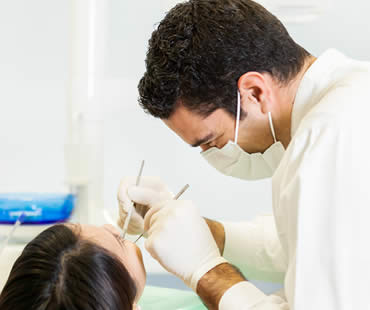
Keeping your teeth and gums in good condition can mean the difference between being embarrassed to smile and being happy to display your pearly whites. Your smile is one of the first things people notice, so here are some things to add to your dental care routine so that your teeth are sparkling and healthy.
Brush after consuming staining items:
Avoid foods and drinks that are known to stain your teeth, such as coffee, red wine, colored gravies, and dark colas. Brush your teeth as soon as possible after consuming such items. If brushing isn’t possible, try eating an apple to help clean away staining residue.
Change your toothbrush:
Old bristles that are out of shape and worn harbor bacteria and don’t as good of a job as newer brushes. Change your toothbrush every three months, or when it starts to look worn. Remember to choose a brush with soft bristles for the best treatment of your teeth and gums.
Floss regularly:
Use dental floss at least once every day to clean between your teeth and along your gums. Carry floss with you so that you can quickly use it in private moments after a meal or bothersome snacks.
Use mouthwash:
Add mouthwash to your daily routine to help kill bacteria that your toothbrush doesn’t reach. It also can help improve your breath.
See your dentist:
No matter how well you care for your mouth, see your dentist every six months for checkups and professional cleanings. This will not only keep your teeth bright, it will catch any problems early in hopes of avoiding more extensive dental work in the future.
If you live in the Sicklerville area contact us today

Denture technology has come a long way since the days of George Washington and his wooden teeth. Unfortunately, people still lose teeth for a variety of reasons including periodontal disease, trauma, and decay. Missing teeth make talking and eating difficult, and can ultimately cause sagging facial muscles. However, with today’s advances in technology it is more possible than ever to replace those lost teeth with natural and comfortable dentures.
Complete dentures cover both upper and lower jaws. The options for complete dentures range from immediate dentures to highly customized implant dentures. Immediate dentures are pre-made and available at your dentist’s office. They are not custom fitted and are set into gum sockets immediately upon removal of your teeth. While these offer the convenience of walking immediately out of the dental office with your new teeth in place, once gum tissue heals and swelling reduces they may shift and become loose. This issue requires follow-up visits for your dentist to make adjustments. People with immediate dentures may also have difficulty speaking, or experience a “clicking sound” when talking.
Conventional full dentures can be made 8 to 12 weeks after tooth loss or removal. Once the gums have healed, your dentist takes a series of impressions of your mouth to be sent away to a dental lab to create your dentures. This process may require multiple visits to your dentist to ensure a proper fit and correct bite. While this process takes longer and is more involved than immediate dentures, you will achieve a more secure and personalized fit. Both conventional and immediate dentures require the use of denture adhesives to keep them securely in place.
For an even more custom, natural looking and secure denture option, implant dentures are an excellent alternative. With implant dentures, small implants are placed in the jaw where they heal in place surrounded by the bone. The denture then snaps into the implant with attachments under the denture. These attachments keep the denture stable, providing more comfort and confidence. You do not have to worry your dentures will slip or fall out while you are eating, talking, or laughing. Implant dentures do not require the use of any denture adhesives.
Talk to your dental professional to determine the best use of denture technology to ensure many years of a confident and comfortable smile.
We look forward to seeing you in our Sicklerville dental office

In the past, replacing lost teeth meant getting dentures or bridges. Even though these offered the best way at the time to restore your mouth’s appearance and function, technology has improved through the development of dental implants. The main drawbacks of bridges and dentures is that they do not feel or look just like real teeth, and it is difficult to chew tough foods. The advantage of implants is that they look and perform so well that you can’t even tell they are not your natural teeth.
Made from titanium, dental implants are screws that are surgically placed directly into your jawbone. They are light and malleable, but durable and strong. The titanium screws are implanted into your jawbone and given time to heal. Once healing is complete, one or multiple crowns are placed on top of the implant to recreate your missing teeth. One implant can hold more than one screw, so it is possible to attach as many crowns as needed to replace your missing teeth.
Dental implants look so much like real teeth that others won’t even be able to tell that you have any artificial teeth. You might even forget about it yourself, as they feel real as well. Since the implants are securely placed in your jaw, they are as strong as real teeth and you are able to chew and bite anything that you would normally eat. Another great thing about implants is that they don’t impact any of your adjacent healthy teeth. While bridges and dentures can sometimes damage neighboring teeth because those teeth are necessary for support, implants avoid this problem. You are left with a fully restored and comfortable smile.
If you live in the Sicklerville area contact us today

Wisdom teeth are the last adult teeth to erupt into the mouth, generally emerging between the ages of seventeen and twenty-one. They are the third set of molars and are in pairs: two each on the top and bottom arch of teeth. While some patients don’t have wisdom teeth, most do. Many of those who do have them don’t have enough room for those teeth to erupt fully, causing them to be wedged under the back of another tooth, impacted in the gum.
Impacted wisdom teeth are very difficult to clean, and can negatively affect the surrounding teeth. They are highly vulnerable to disease and decay and may lead to tooth pain and damage to adjacent teeth. For these and other reasons, a dentist may recommend that the teeth be extracted through oral surgery as soon as necessary to prevent any problems.
Extraction of wisdom teeth is typically an outpatient procedure done in an oral surgeon’s office. A healthy patient can proceed with a typical surgery, but if any infection is detected, the surgery can’t move forward until the infection is cleared up through the use of a full course of antibiotics. Once the surgery is moving forward, the surgeon’s team will administer some form of anesthesia to numb the area surrounding the tooth or to possibly sedate the patient through IV sedation dentistry.
After the anesthesia has fully taken effect, the surgeon makes an incision to open the gum and to remove any bone that is blocking the tooth from extraction. The tissue connecting the bone to the tooth will be separated and the tooth will be removed. In some cases, the surgeon will have to break the tooth into smaller pieces to make it easier to remove. After thoroughly cleaning the area and removing any remaining debris, the incision will be closed, stitched and packed with sterile cotton gauze to staunch any bleeding.
The surgeon will provide aftercare instructions. Patients should follow these instructions to the letter in order to ensure the best and fastest healing of the surgical site.
We treat patients from Sicklerville and the surrounding area

If the prospect of a root canal procedure has you running for the hills, you may want to consider reading over this list of frequently asked questions before you end up cowering in a corner:
- What is root canal therapy? Root canal treatment is performed when decay or trauma has damaged a tooth causing it to die. A dentist or endodontist performs a procedure to remove the diseased or damaged pulp from the tooth and then refills the tooth cavity.
- Is root canal therapy painful? In reality, root canal treatment is intended to relieve pain, not cause it. Because the procedures are very similar, you should experience no more discomfort than having a cavity filled.
- What happens after root canal therapy? Your tooth may be slightly sensitive for a few days, but over-the-counter pain relievers are usually sufficient to relieve any pain you may experience. In order for your tooth to return to full functionality, a crown or other restoration will need to be placed after the root canal therapy is performed.
- What if I opt not to choose root canal therapy? Untreated damage or infection in your tooth can travel through the roots and lead to an abscess or larger infection.
- Is there an alternative to root canal therapy? You could relieve the pain and infection by having your tooth removed. However, this can cause problems such as bone loss, migration of teeth, and bite problems.
In the case of a severely damaged or decayed tooth, the ideal solution is to save your natural tooth through root canal therapy and restoration. Contrary to popular belief, a root canal procedure is no more uncomfortable than having a filling placed in a cavity, and can have enormous benefits to your long-term oral health. Consult with your dental professional to get answers to any other questions or concerns you may have regarding root canal therapy so you can alleviate your fears and return to your healthy smile.
We look forward to seeing you in our Sicklerville dental office

Pregnancy brings many kinds of excitement and joy to a mother’s life, but gum problems aren’t one of them. Pregnancy gingivitis not only causes gum trouble, it can also lead to higher risks for preterm labor and problems with the newborn baby. If you are pregnant and notice swelling or inflammation of your gums, you might have pregnancy gingivitis. It results from plaque buildup that irritates your gums, and can harbor bacteria that gets into your body. The bacteria can travel to your uterus and affect your pregnancy and unborn child. How can you avoid pregnancy gingivitis?
Oral hygiene
Brush and floss your teeth properly. Try to brush after all meals and snacks, especially those high in sugars or starches. See your dentist for frequent cleanings, aiming for two to three times during your pregnancy. This will remove more plaque from your teeth that you can at home, serving to lower your risk for plaque buildup.
Education
Consult your dentist before, during, and after your pregnancy. You will learn how to best care for your mouth, and what to watch for in case a problem does arise.
Nutrition
Maintaining a healthy diet during pregnancy will not only benefit your overall health and that of the baby, but will also limit your sugar intake which promotes plaque formation.
Dental care
Try to have dental procedures performed before you become pregnant. Some emergency procedures are safe during pregnancy, but it is best to have treatment done before pregnancy.
Bacteria control
Avoid sharing food and utensils so that you don’t transfer bacteria from person to person. Your goal is to limit the amount of bacteria in your mouth as much as possible.
Xylitol gum
Chewing sugarless gum promotes saliva, which help equalize the acids in your mouth and fight plaque buildup. The ingredient xylitol has been shown to help prevent bacteria from being able to stick on your teeth, therefore fighting tooth decay.
We look forward to seeing you in our Sicklerville dental office












